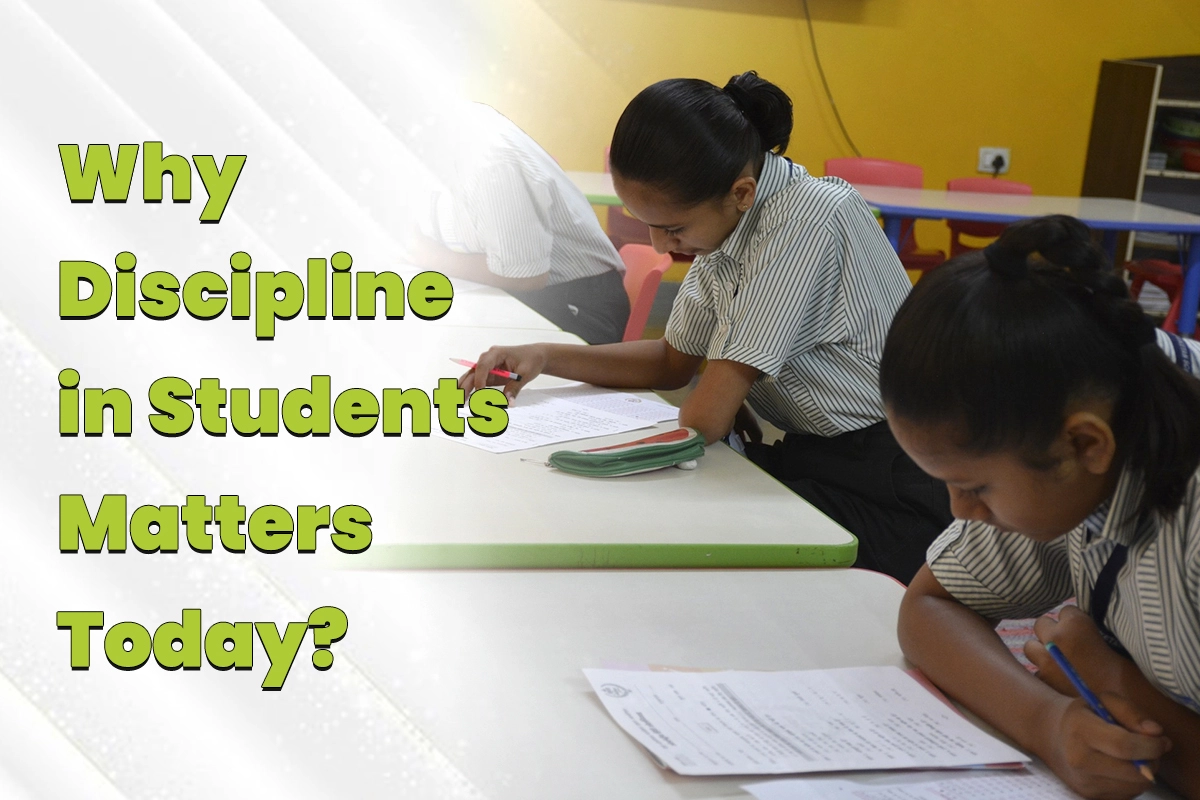These days, with so many distractions and the need for instant satisfaction, discipline in students is crucial. Educators, parents, and society as a whole are trying to figure out how to prepare young folks for a world that’s getting more complicated all the time. That’s why discipline is key to helping students become successful learners and future leaders. In this blog, we’ll dive into why discipline is critical for students today and how it affects their learning and personal growth.
The Foundation of Student Behaviour
At its core, discipline forms the bedrock of positive student behaviour. When students learn to regulate their actions, emotions, and impulses, they create a foundation for success both inside and outside the classroom. Disciplined students are more likely to:
- Follow classroom rules and procedures
- Respect their peers and teachers
- Engage productively in group activities
- Handle conflicts and challenges more effectively
These behavioural outcomes not only contribute to a more harmonious learning environment but also prepare students for the social and professional expectations they will face in their future careers.
Enhancing Classroom Management
Effective classroom management is essential for creating the perfect learning environment. When students display disciplined behaviour, teachers may focus on teaching rather than dealing with disruptive behaviour. This shift in focus results in:
- More efficient use of class time.
- More opportunity for meaningful connections between students and teachers.
- Reduced stress levels among both educators and kids.
- A more positive and effective teaching environment.
Educators who promote discipline can create an environment in which learning thrives and pupils feel encouraged in their academic pursuits.
The Path to Education Success
Discipline is vital for academic achievement. Students that develop disciplined habits are capable of:
- Finishing duties on time.
- Studying consistently for tests.
- Participating actively in classroom discussions.
- Asking for assistance when necessary.
- Persisting in challenging subjects.
These focused ways of learning significantly improve academic achievement and lead to a better understanding of course materials. Furthermore, the habits formed by rigorous study methods frequently grow into lifelong learning skills that serve students long after their formal schooling is completed.
Cultivating Self-Discipline
One of the most significant advantages of discipline in school is the development of self-discipline. The internal regulation allows students to:
- Take responsibility for their own learning journey.
- Make good decisions without requiring continual supervision from others.
- Postpone immediate benefits to attain long-term goals.
- Overcome procrastination and fight distraction.
Students who practice self-discipline are more likely to succeed not only in school but also in their personal and professional lives. The ability to self-regulate is critical in today’s fast-changing and competitive economy.
Fostering Character Development
Discipline is intrinsically linked to character development. As students learn to adhere to rules, meet deadlines, and fulfill their responsibilities, they also develop important character traits such as:
- Integrity
- Reliability
- Perseverance
- Accountability
These qualities shape students into well-rounded individuals capable of making positive contributions to society. The character-building aspect of discipline extends far beyond the classroom, influencing students’ personal relationships, work ethic, and civic engagement.
Creating an Optimal Learning Environment
A disciplined approach to education contributes significantly to creating a positive learning environment. When students collectively embrace discipline, it fosters:
- A culture of mutual respect
- An atmosphere conducive to concentration and focus
- Opportunities for collaborative learning
- A sense of safety and security for all learners
This environment not only enhances the learning experience for individual students but also elevates the educational outcomes for the entire class or school community.
Driving Academic Achievement
The correlation between discipline and academic achievement is well-established. Disciplined students tend to:
- Earn higher grades.
- Score better on standardized tests.
- Demonstrate improved critical thinking skills.
- Show greater proficiency in applying knowledge to real-world situations.
These academic gains are not merely reflections of innate ability but often the result of consistent, disciplined effort. By emphasizing the importance of discipline, educators and parents can help students unlock their full academic potential.
Enhancing Motivation and Focus
Discipline is an efficient method for maintaining motivation and concentration when confronted with distractions and problems. Because digital attention spans are frequently tested, disciplined kids are better prepared to:
- Stay focused on their academics.
- Withstand the appeal of social media and other internet diversions.
- Maintain a continual drive to meet academic objectives.
- Concentrate on the tasks until they are completed.
This improved ability to focus and maintain motivation has a significant impact on both immediate academic accomplishment and long-term personal development.
Instilling a Sense of Responsibility
One significant advantage of discipline in education is the development of a strong sense of responsibility. Students that are disciplined learn:
- Owning their acts and comprehending the repercussions
- Meeting deadlines and obligations
- Positively participating in group projects and classroom activities
- Respecting the shared resources and communal areas
These lessons in responsibility prepare students for the demands of further education, the job market, and adult life in general.
Mastering the Art of Goal Setting
Discipline is strongly linked to effective goal planning. Students who learn to set and follow disciplined goals are more likely to:
- Divide huge activities into smaller, more doable segments.
- Monitor their progress and alter techniques as needed.
- Celebrate their triumphs and learn from setbacks.
- Develop a growth mentality, viewing problems as opportunities.
Setting and accomplishing goals is an important life skill that students can use in a variety of situations, from academic to personal ambitions.
Improving Time Management Skills
As time becomes more valuable, efficient time management skills become increasingly important. Students who maintain discipline can:
- Identify key tasks and manage their time effectively.
- Develop and stick to study strategies.
- Balance homework, extracurricular activities, and personal leisure.
- Prevent last-minute cramming and the stress it causes.
These time management skills not only help students achieve academically but also prepare them to tackle problems in their future employment and personal lives.
Developing Stress Management Techniques
Academic life can be rigorous; thus, stress management is an important ability for students. Discipline in this field includes:
- Developing appropriate coping mechanisms for stress
- Maintaining a healthy lifestyle that includes adequate rest and self-care
- Identifying early indicators of burnout and taking proactive actions to address them
- Reaching out for aid and support as needed
Students who practice disciplined stress management can maintain their well-being while working toward their academic goals.
Building Resilience
Building resilience is one of the most important effects of discipline in school. Students who follow the rules are better able to:
- Get back on track after setbacks and fails
- Keep going even when things get hard
- Adapt to new scenarios and expectations
- Even when things are bad, keep up a good mood.
Today’s students need to be able to handle the ups and downs of life with mental and emotional strength, and this trait is a must.
Wrapping it up
To summarize, discipline is extremely crucial for students nowadays, and this cannot be overstated. It aids in the development of good habits, maintaining classroom discipline, and promoting both academic success and personal growth. As we prepare our students for a more complex and competitive world, teaching them self-discipline, responsibility, and resilience is not a luxury; it is a must.
When we recognize and stress the importance of discipline in education, we may help kids develop the skills and habits they need to succeed in school and later in life. This strategy not only improves their academic performance, but it also contributes to their growth as responsible, capable, and well-rounded individuals prepared to face future problems.









